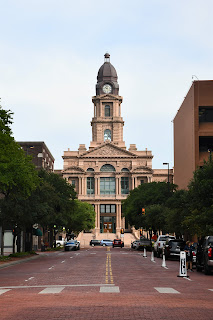Fort Worth
We spent our second day in Texas immersing ourselves in a tourist-friendly version of its culture. After eating breakfast in Fort Worth, we toured the historic centre of the city, which is quite walkable and has some interesting art deco buildings. We also drove down to the Water Gardens.
Fort Worth’s main attraction, however, is East Exchange
Avenue, which can be found north of the city centre. On either end of the
street, massive signs welcome visitors to the Fort Worth Stockyards, where ranchers
kept cattle brought for sale at the Fort Worth Stock Market. I was told by my
local contact that nowadays, cattle are traded at the Stock Market
electronically – that is, without giving the prospective buyer the chance to
check their teeth and pat them on the bottom, or whatever it is people usually
do when prospecting cattle.
Besides the Stock Market building, a number of other
attractions confirm Fort Worth’s status as a historic centre of the wild west.
Visitors can eat and buy souvenirs at one of the many establishments in the
massive repurposed styes, ride horses and sit on longhorns, and buy cowboy
shoes from what I am assured are some of the most renowned cowboy shoe makers. One
of the buildings on the street was a bank famously robbed by Bonnie and Clyde,
who stayed in the neighbouring hotel.
Every day at 11:30 in the morning, the Fort Worth herd of
about a dozen longhorns is paraded down East Exchange Avenue by several men on
horseback, which on the day we visited was an event that filled the sidewalks
with hordes of unmasked tourists. In typical Texan fashion, the arrival of the
longhorns was belted through a megaphone by a rather wide man in a huge hat and
with a comically exaggerated southern drawl. He was also leading a small black
dog, which was saddled by a doll waving a cowboy hat.
After the whole spectacle was over (which given the size of
the herd did not take long), my dad went shopping and I met up with a friend
from Yale. He gave me a short tour of the place, pointing out the Bonnie and
Clyde bank, cannons used at the Alamo in front of the Cowtown Coliseum, and
several other noteworthy buildings. After lunch, we visited a place that calls
itself “The Largest Honkytonk in the World” – I was told that a honkytonk is
not, as I had erroneously supposed, the southern expression for bouncy castle,
but a music and entertainment bar. The one in Fort Worth has a live rodeo and a
concert hall with a long wall of fame dedicated to all the country artists who
performed there.
I left Fortworth with my dad just in time to make it back to
Dallas before the Chapel of Thanksgiving closed. I had intended to visit it the
day before, but our telephone struggle threw a wrench into our plans. The
chapel, which looks like the shell of a sea snail from both the outside and
within, was quite pretty, so I was surprised to find it entirely deserted.
In the evening, as we were sitting in bed, we heard a loud
bang and our window started cracking in all directions. Neither we nor the
technicians could ascertain the cause, but it appears something (perhaps a
stray bullet, perhaps frozen refuse from an aeroplane) broke the outer
windowpane and managed to damage the inner pane as well. We were hurriedly
upgraded to the best suite in the hotel (or so I assume, based on the fact that
its picture is widely used on the hotel’s website), which was an interesting
insight into the USA’s intensely litigious culture.



































Comments
Post a Comment